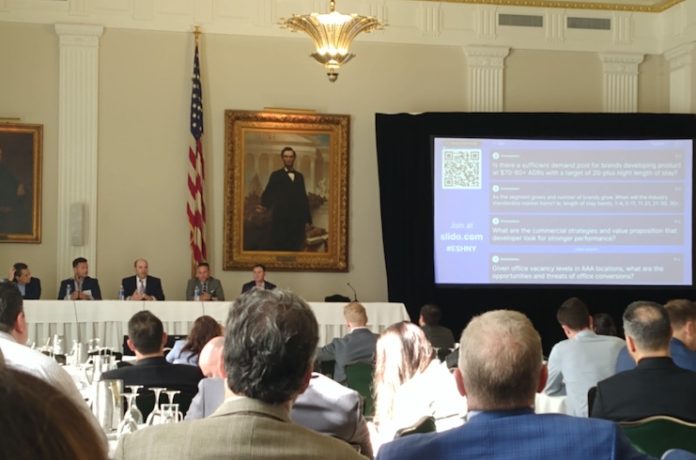
The inaugural Extended Stay Hotel Forum, held last Tuesday at the Union League Club in Manhattan, New York City, focused on development, ownership, and operation in the vibrant extended-stay segment, which comprises more than 51 percent of hotels currently being financed. The event included nine sessions covering trends and strategies in areas such as the economy and lifestyle & luxury segments, site selection and investment, branding, new construction and conversion, revenue management and sales, and technology.
At the opening session, “Extended Stay Today: An Overview & the Long View,” moderator Colin Sherman, director of hospitality analytics with CoStar Hospitality Market Analytics, noted that while extended stay is still performing well, the lower end of the segment has seen a recent decline. “After remarkable growth in performance results throughout the pandemic, we’re starting to see that extended stay is starting to moderate a little bit as of March 2024,” he said. Midscale and economy saw -1.9 percent and -4.7 percent RevPAR declines YTD, respectively. Luxury and upper upscale/upscale, however, saw .7 percent and 3.1 percent RevPAR increases, respectively, over the same period. Sherman also observed a slowdown in terms of development: “During the pandemic, extended-stay development capitalized on investor and owner appetite. The developers are still pumping them out, but just at a little bit lower number.”
“Extended Stay Today” panelists included Ben Brunt, managing principal & chief investment officer, Noble Investment Group; Gary A. DeLapp, president & CEO, StayAPT Suites; Greg Juceam, CEO, Extended Stay America; Ian McClure, CEO, Gulf Coast Hotel Management, Inc.; and David Wilner, SVP, franchise sales & development, Wyndham Hotels & Resorts. Following up on Sherman’s note about RevPAR decline in midscale and economy, Juceam said that the outlook is still “very steady” for extended-stay hotels whose vast majority of business is “7-12 nights average length of stay and have both residential and business traveler guests—unlike extended-stay hotels with more transient business, which fluctuate more.” For historical perspective, Juceam added that during the 30 years he has been with Extended Stay America, the company’s properties have run at about 75 percent occupancy, “and it should continue to be that way because there’s a diverse business mix we can draw from.”
The demand for extended stay should also remain strong due to the challenging state of the residential market for buyers, panelists noted. “I don’t see demand for economy extended stay ever going away; in fact, I see it increasing because of the inability to buy homes [because of] the high interest rates,” said Wilner. Brunt added, “The most successful assets in this segment do have a major residential component to them.” In addition, extended-stay hotels often appeal to the younger generations who would prefer to stay in different places for months at a time instead of committing to leases.
But owner success is not guaranteed by the vitality of the extended-stay segment or the quality of the brand; the properties need to be operated correctly, with a focus on the target customer. “It takes discipline to keep your eye on the ball and say this is a kind of hybrid between a hotel and a multifamily, and there’s a direct correlation between my margins and my length of stay,” Wilner advised. “So, it does take a different sort of viewpoint when you’re getting into this asset class.” Juceam concurred on this point, stressing that the operator “must be willing to turn away a one-night piece of business that’s paying you $199 to potentially take a family that’s paying you $69, and most operators just don’t have the experience or discipline to do that.”
Panelists also shared their views on development approaches and obstacles. According to Wilner, the time is ripe for developers in this space: “This is probably one of the best times to develop if you can develop, because there is limited supply out there, and limited supply coming. So, if there is an opportunity where you can make it work, this is a good time to do it.” Selecting the right site is essential to making it work, and for Juceam, a key quality is “livability.” He further added, “The big thing for all of the brands I’ve ran over the last 30 years is livability … it’s retail, restaurants, the drugstore, the grocery store, those sorts of things.”
Regarding obstacles to development, DeLapp noted that fast growth via franchising remains challenging because it’s tough to get financing. “So, it’s going to be a long road to rebalancing in terms of getting the opportunity to go out and really grow like it was pre-COVID,” he said. McClure added, “We’re seeing challenges on the entitlement process and just getting deals approved by municipalities. Many of them don’t want to have an economy or midscale extended stay. … So, getting a deal to permit can take 12-18 months where it used to take six to nine months in some easy markets.”
Despite these challenges, the stability of the extended-stay segment warrants the development effort, McClure said. “As an investor, we look at this obviously not as recession proof, but definitely recession resistant. As long as demand is there, we don’t see a shock coming.” Juceam added that development has kept pace with demand: “We’ve had a 40 percent increase in supply in extended stay over the last eight years, and demand grew more than that. With the exception of a few months in 2020, demand for extended stay has always been positive.”











